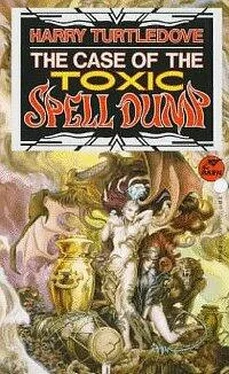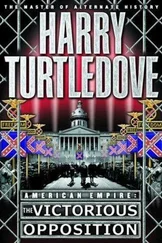“Anything else?” the legate repeated, more sharply this time.
“No, not really. Thanks for your time. Please do keep me informed on how your investigation is going, and let me know the moment Erasmus becomes available for questioning.”
“I will do that, Inspector. Good day to you.”
The work I’d meant to do that morning took up the afternoon instead. I had to keep up with it somehow, which meant I didn’t get out to Chocolate Weasel as I’d planned to do. I wouldn’t manage to do it tomorrow, either, because I was going to take my little portable spellchecker over to the Corderos’ house to see what it could find there. And after that, I figured Bakhtiar’s Precision Burins had moved ahead of it on my list if Persian magic was involved in the Thomas Brothers fire.
People complain that bureaucracies never accomplish anything. I mean, I complain when a bureaucracy I’m not part of succumbs to inertia. Half the time, though, the problem is too few people trying to do too many things in not enough time. I felt like Sisyphus, except getting over to Chocolate Weasel was just one of the stones I had to try to shove to the top of the hill. I kept running back and forth between them, keeping them all from rolling down to the bottom again but not moving any up very far. And every so often, whether I got one of the old stones to the crest of the hill or not, new ones appeared.
All in all, the image was enough to get a man down on ancient Greek religion.
I shoved stones around till it was time to go home. After supper, I called Judy. One of the things that makes troubles smaller is talking about them. Actually, I suppose the troubles stay the same size, but when they’re spread between two people they seem smaller. I told her about poor little Jesus Cordero, and also about what Charlie Kelly had had to say.
“Maybe one of these days Ramzan Durani can synthesize a soul for the little boy,” she said. She has a knack for remembering names and other details that slip through my fingers like sand. Now she went on, “But this other… My God, David, was he serious?”
“Who, Charlie? He sure sounded that way to me. What really frosts me is knowing how much he knows that he’s not telling.”
“I understand,” she said. “But what are we supposed to do while he’s not telling? Just go on with our lives as if we didn’t know anything was wrong? That’s not just hard, that’s impossible.”
“I know, but what choice do we have?” I answered. “People have been doing it as long as there have been people: carrying on inside their own little circles and holding their affairs together as best they could no matter what was going on around them. If they didn’t, I’ve got a feeling the world would have torn itself to pieces a long time ago.”
“Maybe you’re right,” she said, and then, suddenly, “Come over, David, would you? I don’t want to be alone, not tonight, not after what you just told me.”
“Be there in half an hour,” I promised.
I made it, too, with a good five minutes to spare. Judy lives in a flat down in Long Beach, in a neighborhood marginally better than mine. The Guardian at the outer entrance to her building knows me by now, so I didn’t have any trouble getting in. Fair enough; I went there about as often as she came to see me.
I liked her place. It was in an older block of flats than mine, so it had occasional plumbing problems, no ice elemental connection for hot summer days, and a wheezy excuse for a salamander that couldn’t keep the place warm in winter, but there were compensations. The main one, I think, was decently thick walls: you didn’t find out everything your neighbors were up to as if you watched them in a crystal ball.
She’d lived there for five years, and the flat had the stamp of her personality on it. It was crammed with books, maybe even more than mine. The knickknacks (aside from the menorah and brass candlesticks for the Sabbath) were museum copies of Greek and Roman sorcerous apparatus, all mellow clay and greened bronze. The prints on the wall were by Arcimboldo—you know, the fellow who made portraits out of interlocked fish or fruit or imps. They’re endlessly fascinating to look at, and you never can decide just how far out of his tree old Arcimboldo was.
If you think I’m building up to a tale of lurid lovemaking, I’m sorry—it wasn’t like that. We hugged each other, she made some coffee, we talked later than we should have, and when we slept together, that’s all we did: we slept together. If you’re under twenty-five you probably won’t believe me, but sometimes that’s better—and more intimate, too—than twitches and moans. Not, believe me, that I have anything against twitches and moans, but to every thing its season.
My sleep season ended too soon the next morning; the horological demon in Judy’s alarm clock bounced me out of her bed with a bloodcurdling ululation. I hurried back to my place (which luckily wasn’t far out of my way), showered, changed clothes, grabbed a Danish and my portable spellchecker, and headed for the office.
What I had in mind was racing through business in the morning and heading up to the Corderos’ house in the afternoon to take some readings with the spellchecker. That’s what I ended up doing, too, but it wasn’t as simple as I’d had in mind. Something large and unpleasant landed on my desk with a thud.
I don’t quite mean that literally, but the report I was going to have to produce would be fat enough to thud down somewhere. I’ve mentioned that Angels City is in the middle of a drought. The note Bea passed to me explained that some sorcerers up in the north end of the Barony of Angels tried to bring rain with Chumash Indian charmstones, perhaps in the hope that native spirits would have more effect on the local weather than imported white man’s magic.
They got nothing. I don’t mean they didn’t get rain. Nobody’s been able to get much in the way of rain for Angels City the past few years. I mean they got nothing—no sign that the Powers linked to those charmstones were still there to be summoned. What Bea wanted me to do was determine whether the Chumash Powers were in fact extinct.
That’s always a melancholy job. Extinction means something wonderful going out of the world forever, whether from This Side or the Other. The poor Chumash, though, have been so thoroughly dispossessed and assimilated over the last couple of hundred years that no one believes any more in the Powers they once revered. Not only does no one believe in them, hardly anybody even knows they exist. And Powers without believers will die. Even the great Pan is two thousand years dead now.
Heavens, before I could get started, I had to go to the reference library to look up Chumash charmstones and how they fit into the rest of the Indians’ cult. I found out they were used not only for making rain, but also in war (they could make you invisible to arrows), in medicine, and in general sorcery. They tied in with other talismans— ’atishwin , the Chumash called those—and with the Powers who helped the Chumash shamans. And now, by what Bea had passed to me, they were just little carved chunks of steatite, as inert as if they’d never had any magical intent at all.
I went up to Bea’s office, shot the breeze with her secretary (Rose really runs that place; if she ever quit, we’d fall apart) until she got off the phone, then ducked in fast before it made noise again. “What’s my priority on this Chumash thing?” I asked her. “The Devonshire project is taking up a lot of my time right now.”
“I know,” she answered. “It still comes first—it’s active, while if the Chumash Powers really are extinct, there’s no hurry about saying so. You’ll want to get a more formal investigation going to check that out one way or the other, have the thaumaturges see if the Chumash gods of the Upper World, the First People, or the Nunashish of the Lower World are still accessible to invocation.”
Читать дальше












